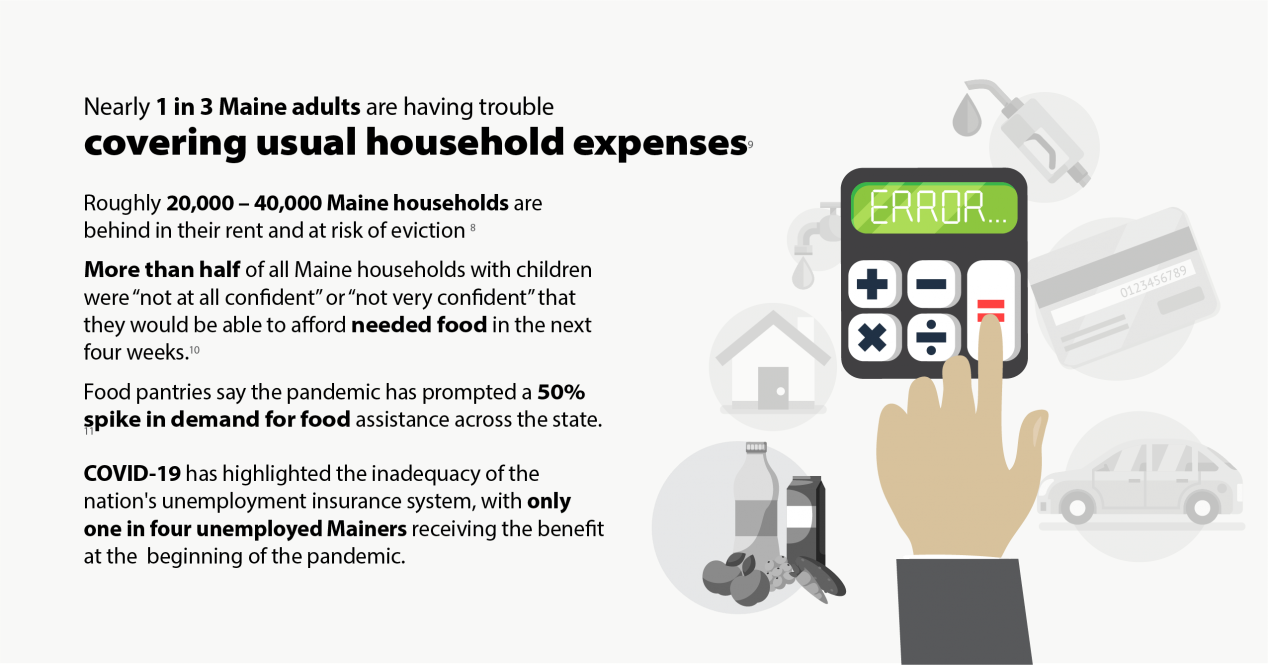Unemployment Insurance
The fact that Maine’s unemployment insurance (UI) system has been unable to meet the needs of many Mainers who have lost their jobs or been forced to stay out of the workforce due to COVID-19 is deeply unfortunate, but not surprising.
Only by an act of Congress in the midst of this public health emergency have unemployed workers long left out of the system been reached, and the inadequacy of benefit amount and duration recognized and temporarily addressed. Yet, these changes represent only a short-term fix when far more fundamental change is needed. The labor market has undergone seismic shifts since the UI program was created more than eight decades ago, including major declines in the share of employment in manufacturing, full time work as a share of all work, and large increases in the services sector, part-time and temporary work. Policymakers have ignored the need for UI reform and modernization, and the program has been chronically underfunded and understaffed.
Now COVID-19 has shaken the economy and our workforce, and the UI system is revealed as broken. We owe it to workers and their families to rebuild it stronger and more resilient to today’s economic shocks, and quickly.

Unemployment insurance is desperately in need of modernization, reform, and adequate funding. We must ensure that people who need it are able to get enough help when they need it. We must invest in staffing and infrastructure to ensure that people are able to access benefits smoothly and promptly. There are concrete steps we can take now and, in the future, to ensure that this program works effectively to provide income replacement for unemployed workers and to help stabilize our economy in tough times. We must:
- Require the state to improve access to unemployment benefits for those who need the help, ensuring that workers previously shut out of the system can access needed benefits;
- Ensure that Maine’s unemployment insurance benefits provide adequate economic security to unemployed workers and their families, including adequate amounts, duration, dependency benefits, and partial benefits;
- Inform workers about unemployment insurance (UI) and how to access it, including any accommodations they may need; require employers to notify separated workers about the program; other governmental agencies should steer people who are applying for other supports and programs to UI when appropriate;
- Provide adequate access to education and training assistance in Maine’s unemployment system necessary to respond to the structural issues of unemployment in today’s economy; and
- Improve access to work-sharing programs that will both minimize unemployment and maintain workforce attachment.
The Peer Workforce Navigator Project is a coalition of community-based organizations in partnership with the Maine Department of Labor (MDOL). We help people make connections with education and training, apprenticeships, unemployment insurance, healthcare, public benefits, and things they need to get and keep a good job.
Each organization brings expertise, networks, relationships, and trust built over time to provide reliable, up-to-date information and opportunities to community members and to support economic empowerment for all workers in Maine. Our coalition includes: Food AND Medicine, Gateway Community Services Maine, Maine AFL-CIO, Maine Equal Justice and Prosperity Maine.
This project is built and informed by our communities and for our communities. There is always space for people looking to join us in this project! Learn more and get involved!
To learn more or get involved you can contact Adam Goode at Maine AFL-CIO at adam@maineaflcio.org.